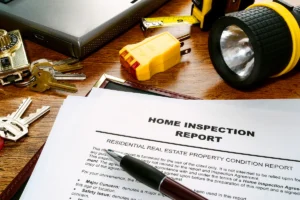Navigating the seller’s disclosure process might feel like trying to decode hieroglyphics, but it doesn’t have to. When you’re selling your home, you’re required by law to disclose certain information to prospective buyers. But how can you be sure you’re covering everything you need to?
And what could happen if you don’t? Let’s demystify this crucial step in the home-selling process, so you can approach it with confidence and avoid potential pitfalls.
Wondering where to start? Keep following, there’s more to uncover.
Understanding the Seller’s Disclosure
As a seller, it’s crucial that you thoroughly understand the Seller’s Disclosure, a document outlining the condition of your property and any potential issues or defects. This document isn’t merely a formality; it’s a critical part of the selling process. Yet, several disclosure misconceptions persist, leading to unnecessary complications.
Some sellers believe that it’s better to avoid disclosing defects, thinking it will make their property more attractive. This is a misconception. Full disclosure actually benefits you as a seller. It fosters trust, reduces the risk of lawsuits, and helps to set realistic expectations about the sale price.
The disclosure benefits are extensive. It serves to protect you from future legal action. If a buyer discovers a problem after the sale, they can’t accuse you of hiding information if it was included in the seller’s disclosure. Furthermore, it allows potential buyers to make an informed decision, ensuring a smoother transaction process.
But remember, honesty is the best policy. Disclosing all known issues, even minor ones, will save you headaches down the line. Don’t let misconceptions cloud your judgment. Embrace transparency and reap the benefits that come with it.
Legal Requirements for Disclosure
Navigating the legal requirements for disclosure can seem daunting, but it’s essential to get it right. You must disclose any known defects or issues with the property to potential buyers. This not only aids in transparency but also protects you from future legal disputes.
It’s important to understand that each state has its own set of laws regarding seller disclosures. These state variations dictate what you’re required to reveal about your property. Some states have extensive lists, while others are more lenient. In some cases, you may need to fill out a specific form or follow a particular procedure laid out by the state.
Ignoring or avoiding these legal requirements can lead to hefty disclosure penalties. For instance, if you intentionally conceal a defect, you could face legal action from the buyer. Penalties vary state by state, but they can include fines, lawsuits, or even the cancellation of the sale.
Essential Items to Disclose
When selling your home, it’s crucial to know which items you’re legally obligated to disclose to potential buyers. This isn’t a step you can afford to skip, since it’s all about establishing trust and avoiding future legal disputes.
First on the list are structural issues. If your house has any hidden defects, like a crumbling foundation or a leaky roof, you’re obliged to reveal them. Don’t try to sweep these under the rug; it’s better to be upfront.
Past issues with pests, such as termites or rats, should also be disclosed. Even if you’ve addressed these nuisances, potential buyers have the right to know the property’s history.
Then comes the disclosure timeline. You can’t delay this process. As soon as you decide to sell, you need to start preparing your disclosure. It’s typically presented to buyers after an offer is made, but before the sale is finalized.
Any significant events, like fires or floods, should be revealed. If these have impacted the property, you must disclose them.
Impact of Non-Disclosure
Failing to disclose vital information about your property can lead to serious consequences down the line. Known as non-disclosure consequences, these can range from financial penalties to legal action. This is because Consumer Protection Laws are in place to ensure that buyers are fully informed about the property they’re investing in.
Consider this table to understand the possible impacts:
| Potential Consequences | Emotional Impact | Financial Impact |
|---|---|---|
| Legal Action | Stress | High Costs |
| Financial Penalties | Frustration | Monetary Loss |
| Loss of Trust | Embarrassment | Lost Opportunities |
Legal action could result in high costs and stress, while financial penalties could lead to monetary loss and frustration. Moreover, non-disclosure can damage your reputation, leading to embarrassment and lost opportunities.
In essence, honesty is the best policy when it comes to selling property. Disclose all relevant information to avoid any non-disclosure consequences, maintain trust with buyers, and uphold the principles of consumer protection laws. After all, a successful sale is based on mutual trust and transparency. Don’t let non-disclosure derail your selling process.
Making Disclosure Process Simpler
Despite the potential hurdles, there are ways to make the disclosure process less daunting and more straightforward for sellers. You might feel overwhelmed with all the technical jargon and legal obligations. But don’t worry, help is on the way. It’s all about simplifying disclosure language and embracing disclosure technology advancements.
First, let’s tackle the language issue. Instead of getting lost in a sea of legalese, seek ways to simplify the disclosure language. Use plain English where possible, and don’t hesitate to ask for clarification if something isn’t clear. Remember, this is about protecting both you as the seller and the potential buyer.
Now, let’s talk about technology. Disclosure technology advancements have made the process easier and more efficient than ever. There are now software platforms and apps specifically designed to guide sellers through the disclosure process, making it less of a chore and more of a checklist. This helps ensure you’re covering all your bases without getting bogged down in the details.
Frequently Asked Questions
How Often Does a Seller’s Disclosure Need to be Updated?
You’ll need to update your seller’s disclosure whenever there’s a significant change to the property. Disclosure frequency isn’t set in stone; it’s more about the update necessity when changes occur. Stay proactive for transparency’s sake.
What Sort of Information Do I Need to Gather Before Filling in a Seller’s Disclosure?
You’ll need to gather details about your property’s condition, improvements, defects, and legal issues. Remember, preparing documents thoroughly and understanding disclosure timelines is crucial in avoiding potential legal problems down the line.
Are there any penalties for giving incorrect information in a seller’s disclosure?
Yes, there are penalties for disclosure inaccuracies. If you provide incorrect data, you’re risking legal implications. Dishonesty can lead to lawsuits, fines, or even the sale’s cancellation. Always verify your information’s accuracy.
Can I change my seller’s disclosure after it has been submitted?
Yes, you can change your seller’s disclosure after submission through disclosure amendments. It’s not uncommon to make post submission changes if you’ve forgotten or omitted information. Be sure to do it promptly.
What Happens if I Don’t Know the Answer to a Question on the Seller’s Disclosure Form?
When dealing with disclosure uncertainties, it’s fine if you don’t know every answer. Leave unanswered queries blank or write ‘unknown’. Honesty is crucial, so don’t guess or provide misleading information on your seller’s disclosure.
Conclusion
In wrapping up, don’t let the seller’s disclosure intimidate you. It’s legally required and critical for a smooth real estate transaction.
Remember, it’s all about honesty. Don’t hide major issues, as non-disclosure can lead to lawsuits. Keep it simple, provide essential details, and you’ll avoid potential complications.
The disclosure process doesn’t have to be overwhelming. With a clear understanding and approach, you’ve got this!




